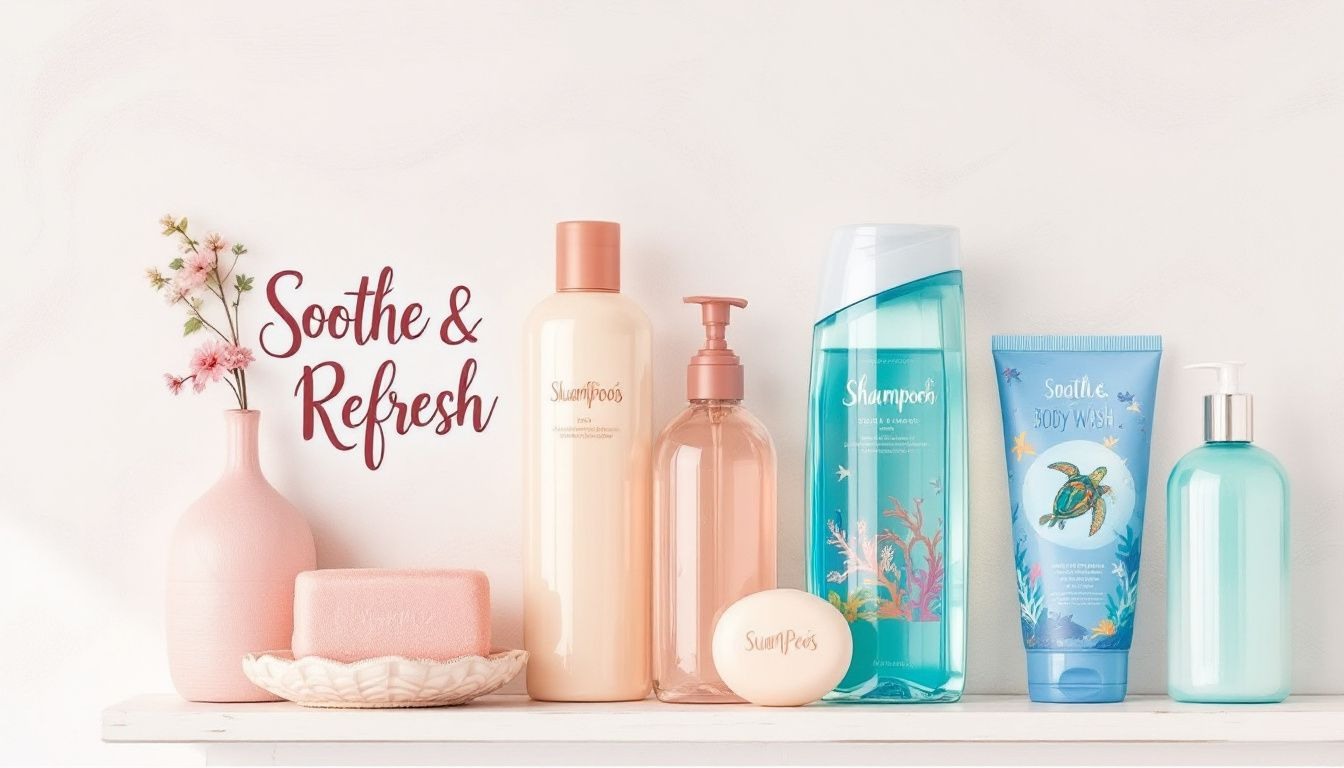Wondering if you can use shampoo as body wash? The short answer is yes, occasionally. However, can I use shampoo as body wash? It’s important to note that shampoos and body washes are formulated differently. Read on to understand the impact and find out the best alternatives for maintaining healthy skin.
Key Takeaways
Shampoo and body wash have different formulations; shampoo is made for hair and can be too harsh for skin.
Occasionally using shampoo as body wash is okay in emergencies, but it’s best to return to body wash to avoid skin issues.
Experts recommend using skin-specific products for optimal health, as regular use of shampoo on skin can lead to dryness and irritation.
Understanding Shampoo and Body Wash

Shampoo and body wash might share some common ground—they’re both liquid surfactants designed to cleanse—but their purposes and formulations are quite distinct. Shampoos typically aim to cleanse hair by removing dirt, oil, and residues, whereas body washes are crafted to clean and hydrate the skin. These differences explain why shampoos and body washes aren’t always interchangeable.
The formulations of these products are tailored to their specific roles. Shampoos are designed for hair care, often featuring surfactants that dissolve oily dirt. On the other hand, body washes are formulated to be gentle on the skin, often including moisturizing agents to prevent dryness. This distinction is important when contemplating substituting one for the other.
Read More: Native Shampoo Review
Purpose of Shampoo
The primary function of shampoo is to clean the hair and scalp. Shampoos are specifically crafted to target and eliminate oils and residues from the hair and scalp, ensuring that your hair remains fresh and clean. Surfactants in shampoos dissolve oily dirt and excess oils, ensuring cleanliness.
Shampoos typically lather well, helping to lift away grime and sebum, leaving the hair feeling clean and light. Shampoos maintain scalp hygiene and prevent buildup, promoting healthy hair and appearance.
However, these same surfactants can be too harsh for the skin, potentially leading to dryness if used as a body wash regularly.
Purpose of Body Wash
Body washes are designed with the skin’s unique needs in mind. Unlike shampoos, body washes contain higher concentrations of skin-friendly surfactants, which cleanse the skin effectively without stripping it of moisture. Maintaining a delicate balance of oils is crucial for hydrated and healthy skin.
Dermatologists note that while shampoos cleanse hair effectively, body washes cater to various skin types and concerns. They often include moisturizing agents and ingredients that help maintain the skin’s natural pH balance, preventing dryness and irritation. This makes body washes a more suitable option for daily skin cleansing compared to shampoos.
Can Shampoo Be Used as Body Wash?

Can shampoo substitute for body wash? Yes, but with some caveats. While shampoo can serve as a substitute for body wash in a pinch—like during travel or an unexpected shortage—it shouldn’t become a regular habit. While both products share cleansing ingredients, shampoos lack the skin-specific components found in body washes.
Using shampoo occasionally as a body wash is generally safe, especially when you’re in a hurry or traveling without your usual supplies. However, it’s important to switch back to body wash as soon as possible to avoid potential skin issues. The primary issue is the difference in formulations tailored for hair care, not skin care.
Differences in pH Levels
One significant difference between shampoo and body wash is their pH levels. Shampoos typically have a higher pH level, which is suited for cleansing hair but can disrupt the skin’s natural pH balance. Body washes are usually pH balanced to maintain skin health, ensuring they cleanse without causing irritation or dryness.
This pH mismatch can cause skin dryness when using shampoo in place of body wash.
Potential Consequences
Regularly using shampoo as body wash can lead to a slew of skin issues. The stronger surfactants in shampoo, while great for removing oil and dirt from hair, can strip the skin of its natural oils, leading to dryness and irritation. Over time, this can compromise the skin’s barrier function, making it more susceptible to damage and environmental stressors.
Frequent use of shampoo on the skin can worsen dryness, especially because of sulfates in many shampoos. These ingredients, formulated to tackle oily hair, can be too harsh on the skin, potentially leading to long-term dryness and irritation.
Therefore, while occasional use might not cause significant harm, making it a regular practice is not advisable.
When to Use Shampoo as Body Wash
There are situations where using shampoo as body wash might be unavoidable. For instance, during travel or emergencies, shampoo can be a convenient alternative. It’s a practical choice when packing light, as carrying fewer products can save space and reduce weight. However, these instances should be kept to a minimum to avoid potential skin issues.
Using shampoo as body wash occasionally is generally safe, but it’s crucial to switch back to body wash for regular use. This ensures that your skin receives the hydration and care it needs to stay healthy. Additionally, individuals with sensitive skin should be particularly cautious when substituting body wash with shampoo.
Short-Term Use
Temporary use of shampoo on the body is typically harmless if it’s a rare occurrence. In emergencies or when you’re in a pinch, using shampoo as a body wash is a convenient solution.
However, reverting to body wash for regular skin care is crucial for maintaining skin health.
Sensitive Skin Considerations
Individuals with sensitive skin may experience irritation if they use shampoo as a body wash. This practice can also result in dryness. Shampoos with harsh chemicals or strong surfactants can exacerbate these issues, making the skin feel overly dry or irritated. Therefore, it’s important for individuals with sensitive skin to avoid using shampoo regularly on their bodies.
If you have sensitive skin and find yourself without body wash, consider using a gentle facial cleanser instead. Facial cleansers, being gentler, may cause less irritation compared to shampoos. This can help mitigate the risk of skin issues when you’re in a bind.
Alternatives to Using Shampoo as Body Wash

When you run out of body wash, there are several alternatives to consider before reaching for your shampoo. Using a bar soap, face wash, or shower gel can be more suitable options that provide better skin care. These products are specifically formulated to cleanse the skin without causing dryness or irritation.
Face washes and scrubs can temporarily replace body wash. They are designed to be gentle on the skin while effectively removing dirt and oil. These options help keep skin healthy and hydrated when body wash isn’t available.
Using Bar Soap
Bar soap is a practical and effective alternative to shampoo for body cleansing. Formulated specifically for skin, bar soap is designed to remove dirt and oil without stripping the skin of its natural moisture. Additionally, bar soaps are often free of water, making them less prone to bacterial growth compared to liquid options.
A mild bar soap avoids stripping natural oils, helping maintain hydration and prevent dryness. Bar soap can be a convenient and effective option, especially when you’re looking for an alternative to body wash that won’t compromise skin health.
Face Wash or Shower Gel
Using face wash or shower gel as an alternative to body wash can provide better skin care than shampoo in emergency situations. These products are formulated with skin-friendly ingredients that cleanse effectively without causing dryness or irritation. Shower gels often contain moisturizing agents to maintain skin hydration.
Face washes, designed to be gentle on the skin, can also serve as a suitable substitute. They contain cleansing agents that remove dirt and oil while being kind to the skin. These alternatives can help ensure that your skin remains healthy and hydrated even when you’re out of body wash.
Expert Opinions on Using Shampoo as Body Wash

Experts advise caution using shampoo as body wash because it’s formulated for hair care, not skin. Dermatologists warn that regular use of shampoo on skin can cause dryness and irritation due to the absence of moisturizing ingredients. Hair care specialists also emphasize that shampoo may not provide adequate hydration for the skin, potentially affecting overall skin health.
Both dermatologists and hair care professionals recommend using products specifically designed for either hair or skin to maintain optimal health. This ensures that each part of your body receives the care it needs without compromising on hydration or protection.
Dermatologist Advice
Dermatologists generally advise against using shampoo as body wash regularly due to the risk of skin irritation and dryness. Shampoos are formulated primarily for hair, and using them on the skin can lead to potential issues over time. For individuals with sensitive skin, using a baby shampoo can be a safer option as it tends to be gentler.
Overall, dermatologists recommend using products specifically formulated for skin care to maintain optimal skin health. This ensures that your skin remains hydrated, protected, and free from irritation.
Hair Care Specialist Insights
Hair care specialists note that body wash is generally ineffective for cleaning hair. While shampoo can cleanse the body in emergencies, it lacks the skin-specific ingredients of body washes. Conditioning agents in shampoo may not be beneficial for the skin, potentially leading to issues like dryness or irritation.
To maintain optimal hair and skin health, experts recommend using dedicated products for each purpose. This ensures that both your hair and skin receive the appropriate care and nourishment they need to stay healthy and vibrant.
The Role of Two-in-One Products
Two-in-one products, combining shampoo and body wash into a single bottle, have gained popularity for their convenience. These products are designed to simplify the grooming routine by fulfilling both hair and skin cleansing needs in one step. These products combine shampoo and body wash functions, streamlining personal care.
However, while two-in-one products can be convenient, they may not always provide the best results for either hair or skin. The formulation of these products aims to strike a balance between cleansing and conditioning, which can sometimes compromise their effectiveness.
Benefits of Two-in-One Products
One of the key benefits of two-in-one products is the time and space they save. By eliminating the need for separate shampoo and body wash, these products can make showers quicker and more efficient. This is especially beneficial for busy individuals or frequent travelers.
Additionally, using a single product can lead to cost savings. Instead of purchasing multiple items, a two-in-one product can help you save money on personal care products. This economic benefit, coupled with the convenience of having fewer bottles to manage, makes two-in-one products an attractive option.
Drawbacks of Two-in-One Products
Despite their advantages, two-in-one products have drawbacks. They might not perform as effectively as dedicated shampoos or body washes, potentially leading to suboptimal cleansing. The balance required to cater to both hair and skin can sometimes result in a product that doesn’t fully satisfy the needs of either.
Regular use of two-in-one products can cause buildup, making hair look dull and heavy over time. This can compromise the health of both hair and scalp, contradicting the convenience these products aim to provide.
Maintaining Optimal Skin and Hair Health

Maintaining optimal skin and hair health requires using products specifically designed for their respective purposes. Using products suited to your skin and hair types is crucial for their health and appearance. Shower gels and face washes are better alternatives to shampoo for body cleansing.
Products with suitable pH levels help maintain the natural balance of your skin and hair. Additionally, staying hydrated and using moisturizers suited for your skin type helps maintain hydration and prevent dryness and irritation.
Choosing Appropriate Products
Understanding your skin type is crucial in selecting the right products. Different skin types need specific products for optimal health; using the wrong ones can cause adverse reactions. Selecting products specifically designed for individual skin and hair types enhances their effectiveness.
Many modern bar soaps are formulated with added moisturizers to mitigate dryness caused by their higher pH levels. They can be a good option for quick cleansing, especially for those with oily skin. Avoiding popular products without understanding their suitability can prevent adverse reactions.
Hydration and Nourishment
Maintaining optimal hydration is critical for overall skin health. Using moisturizers suited for individual skin types helps to maintain hydration. Ingredients such as hyaluronic acid, glycerin, and ceramides are excellent for moisture retention and targeted hydration.
Incorporating specialized products and hydrating ingredients is key for nourishing the skin effectively. This helps to preserve skin elasticity, prevent dryness and irritation, and maintain a healthy, vibrant appearance.
Honest Review
Using shampoo as body wash can be a convenient, time-saving solution, particularly for those with busy lifestyles or during travel. This approach reduces the number of shower products, potentially lessening the environmental impact. However, the formulation of shampoo, designed for hair, may lead to potential skin irritation and dryness when used regularly on the body.
Experts advise against making this a frequent practice. While shampoo can temporarily stand in for body wash without causing immediate harm, the long-term effects could include skin dryness and irritation. It’s best to use products specifically formulated for their intended purposes to maintain healthy skin and hair.
Summary
In summary, according to Met Gala research while using shampoo as body wash might work in a pinch, it’s not the best long-term solution. The differences in formulations cater specifically to hair or skin, making each product more effective in its intended role. Regular use of shampoo on the skin can lead to dryness and irritation due to its higher pH levels and harsher surfactants.
To maintain optimal skin and hair health, it’s important to use products formulated for their specific purposes. Alternatives like bar soap, face wash, or shower gel can provide better skin care when body wash is unavailable. Remember, your skin and hair deserve the best care, so choose products that meet their unique needs.
Frequently Asked Questions
Can I use shampoo as body wash regularly?
It’s best not to use shampoo as a body wash regularly, as it can cause skin dryness and irritation since it’s formulated for hair, not skin. Stick to body wash for the best care!
What should I use if I run out of body wash?
If you run out of body wash, you can easily use bar soap, face wash, or even shower gel as alternatives. They’re just as effective for keeping your skin clean!
Are two-in-one products effective?
Two-in-one products are convenient, but they often don’t deliver the same effectiveness as using separate shampoo and body wash. If you’re looking for the best results, consider using them separately.
Is it safe to use baby shampoo as body wash?
Yes, baby shampoo can be a gentle option for body wash, especially for sensitive skin, but it’s best to use it sparingly.
What are the potential consequences of using shampoo on the body?
Using shampoo on your body can really dry out your skin and cause irritation. It’s best to stick with products designed for your skin to keep it healthy and happy.



